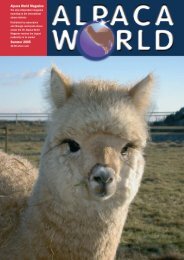Winter - Classical MileEnd Alpacas
Winter - Classical MileEnd Alpacas
Winter - Classical MileEnd Alpacas
You also want an ePaper? Increase the reach of your titles
YUMPU automatically turns print PDFs into web optimized ePapers that Google loves.
<strong>Alpacas</strong> for lifestyle<br />
Perhaps the most common reason people<br />
become involved with alpacas is because they<br />
are such enchanting animals. The idyllic<br />
situation of a small herd of alpacas gently<br />
grazing hillsides providing a picturesque<br />
view from the front verandah is attractive.<br />
It could be just a few wethers to mow the<br />
paddock and showing a beautiful range of<br />
natural colours. Or possibly a small herd of<br />
breeding females and the excitement of a new<br />
born cria every few months. The endearing<br />
and intelligent nature of alpacas draws some<br />
people while others are attracted to the<br />
luxurious fine fleece. <strong>Alpacas</strong> are possibly<br />
the most environmentally friendly livestock,<br />
with soft padded feet and don't need mulesing<br />
or crutching. Not susceptible to foot rot and<br />
flystrike alpacas are a common choice for<br />
busy people seeking relatively maintenance<br />
free livestock. Gentle on fences, the ability to<br />
be halter trained and even kept as pets, it is<br />
understandable why alpacas are so popular.<br />
However, to purchase alpacas simply as<br />
an investment, put them in a paddock to<br />
breed and expect a financial return is a huge<br />
risk. This approach is ultimately likely to<br />
lead to disillusioned alpaca breeders that<br />
have failed to achieve their goal. Who is<br />
responsible for tracking market trends? Who<br />
is making wise management and marketing<br />
decisions? Keeping in touch with industry<br />
directions and making good decisions about<br />
management is vital for success and requires<br />
some effort. On the other hand one could<br />
successfully invest in alpacas if they were<br />
managed by an experienced alpaca breeder<br />
with good management techniques and a<br />
sound business plan. <strong>Alpacas</strong> may be owned<br />
outright or in a syndicate and agisted with<br />
a reputable breeder. In this situation the<br />
investor may choose to relinquish control<br />
over livestock management decisions and<br />
is charged for the services of the expert<br />
alpaca breeder. For an owner of just a few<br />
alpacas this approach may be more cost<br />
effective, taking advantage of the expertise,<br />
marketing and reputation of an established,<br />
experienced breeder.<br />
"There are a growing number of people involved<br />
in alpacas running highly successful and<br />
profitable businesses. There is now a world wide<br />
community of successful alpaca businesses<br />
trading not only within their own country but also<br />
internationally."<br />
<strong>Alpacas</strong> for Investment<br />
Possibly the poorest reason to become<br />
involved in alpacas is as an investment. Stocks<br />
and shares, gold, antiques and fine artwork<br />
may be reasonable investments as they<br />
involve no maintenance and little business<br />
expertise. It is quite common for someone<br />
to invest in an object of value and perhaps<br />
rarity and expect that one day it will be worth<br />
more than the initial cost. An investment<br />
shouldn't require constant attention or work<br />
to increase its value. Although, real estate,<br />
gold or shares, may provide good financial<br />
returns some investors are attracted to<br />
alpacas because they want to be part of an<br />
exciting, growing industry. There is also<br />
the enjoyment of touching and seeing your<br />
investment (the alpacas) grow and breed.<br />
<strong>Alpacas</strong> for business<br />
There are a growing number of people<br />
involved in alpacas running highly successful<br />
and profitable businesses. There is now a<br />
world wide community of successful alpaca<br />
businesses trading not only within their own<br />
country but also internationally. A business<br />
differs from a simple investment in that it<br />
requires a plan and constant attention to be<br />
successful. However, satisfaction that comes<br />
from a successful alpaca business is both<br />
financially and personally rewarding. The<br />
key ingredients to owning and operating a<br />
successful business are common across a wide<br />
range of businesses. To own and run an alpaca<br />
business requires;<br />
■ Research market opportunities and<br />
sustainability – <strong>Alpacas</strong> have been run in<br />
Australia since 1988 and although their<br />
value, in general has declined slowly over a<br />
long period the industry is well established<br />
and sustainable. In fact the lower average<br />
price has made it possible for more people<br />
to become involved in the industry which<br />
is growing. Although the average price per<br />
alpaca is considerably less than in 1988,<br />
individual elite alpacas are commanding<br />
record prices.<br />
■ Research stock quality – Depending on<br />
the goals and objectives of the business<br />
the type, number and quality of initial<br />
alpacas purchased may be quite different in<br />
various business situations. Embryo transfer<br />
technology has enabled owners of very low<br />
quality females to access and purchase top<br />
quality genetics in the form of embryos.<br />
Initial stock quality and quantity to some<br />
extent determines a breeder's role in the<br />
industry.<br />
■ Development of a business plan with<br />
projected costs and income – There are<br />
numerous courses and opportunities<br />
available to learn about business<br />
management. If the intent is to make<br />
money, the farm must be run in a business<br />
fashion with management of a budget that is<br />
realistic and achievable.<br />
■ Development of a breeding plan –<br />
Understand your market and construct<br />
a plan to breed alpacas that are sought<br />
after. Knowing how to recognize and<br />
breed top quality alpacas is critical to gain<br />
recognition and therefore reputation within<br />
the industry. Market trend may change over<br />
time. However, a good breeding plan should<br />
be flexible to a certain degree, but also<br />
adaptable and stable enough to cope with<br />
changes without starting at the beginning<br />
with each new idea.<br />
■ Development of a marketing strategy or<br />
plan – Perhaps identify a niche market that<br />
suits your position. Maybe a particular<br />
colour or type of alpaca that assists<br />
you in standing out from the crowd.<br />
Often marketing includes attending and<br />
competing in shows. It certainly involves<br />
some sort of advertising to your target<br />
market. The development of a marketing<br />
plan goes hand in hand with a business<br />
plan. There is no financial gain to be made<br />
breeding the world's best alpacas if no one<br />
knows about them.<br />
■ The desire to succeed – There is no<br />
doubt about the fact that to be successful<br />
in business requires some risks, a lot of<br />
effort and plenty of hard work. There are<br />
often hiccups and obstacles along the way<br />
that require research, perseverance and<br />
determination to work through and achieve<br />
success.<br />
Alpaca World Magazine <strong>Winter</strong> 2007 / 08<br />
39







